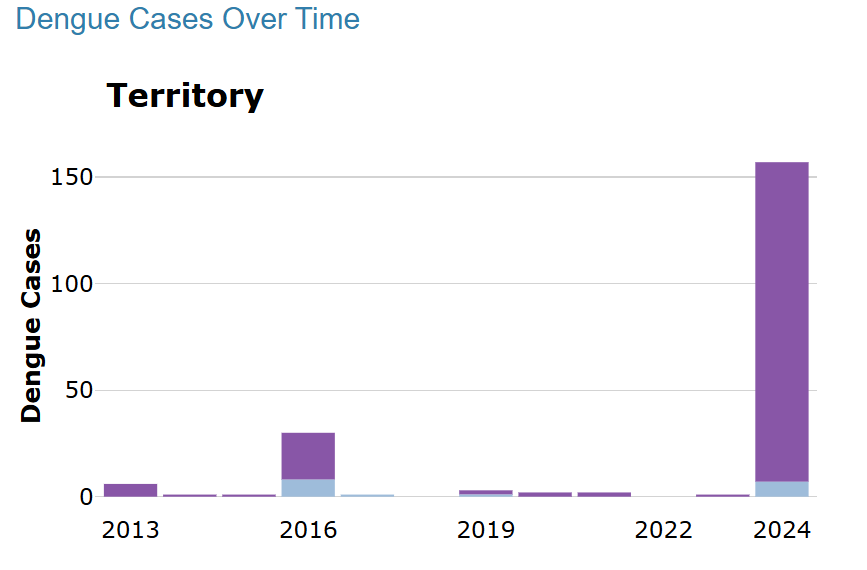The U.S. Virgin Islands (USVI) Department of Health’s Epidemiology Division has teamed up with the Center for Disease Control (CDC) and the Puerto Rico Department of Health’s Vector Control Unit to combat the dengue outbreak in the territory, particularly in the St. Thomas-St. John District.
Health officials have reported 150 confirmed cases of dengue to date, with 102 cases on St. Thomas, 37 on St. John, and 11 on St. Croix, though the true number of cases may be higher due to unreported cases. Seven probable cases have been reported also. This is a dramatic increase in cases compared to recent years (see chart below).
“In response to the outbreak, the Department of Health has mobilized teams in the St. Thomas-St. John District,” said Dr. Esther Ellis, Territorial Epidemiologist. “These teams, in collaboration with the CDC and Puerto Rico Vector Control Unit, began working today to control the spread of dengue through community outreach and mosquito control efforts.”
Outreach teams began work recently in high-risk zones which have been identified as Smith’s Bay, Anna’s Retreat, Charlotte Amalie estate and Bovoni in St. Thomas, and Fish Bay on St. John. A high-risk zone is an area with more than five confirmed dengue cases.
Teams will inspect residential areas, apply larvicides in high-risk zones, and educate the public on preventing mosquito bites and controlling breeding sites.
Outreach activities will continue until November 8th, and residents are urged to cooperate and take preventive measures like using repellents and eliminating standing water.
In addition, they announced that it has implemented a dedicated hotline aimed at educating residents on dengue fever prevention and protecting the community.
The hotline, managed by the department’s Epidemiology Division, will provide essential information on protective measures, transmission prevention, and other resources for those impacted by the outbreak, according to DOH.
Residents may call the hotline at (340) 725-5389 or (340) 774-7477 ext. 5647, available Monday through Friday from 8 a.m. to 5 p.m. The hotline also allows individuals in hotspot areas, such as Smith Bay, Charlotte Amalie, Anna’s Retreat, Nazareth, Hospital Ground on St. Thomas, and Fish Bay on St. John, to request mosquito control measures around their homes, with services offered through November 8.
Dengue symptoms range from mild to severe and can sometimes be life-threatening. Common symptoms include fever, pain behind the eyes, muscle or joint pain, nausea, vomiting, and rash. These symptoms usually last two (2) to seven (7) days, and most people recover within a week. It’s important to rest and take acetaminophen for fever relief but avoid aspirin or ibuprofen.
Subscribe to Outbreak News TV on YouTube
If you experience dengue symptoms, we are urging you to consult your primary care doctor and get a blood test to confirm the virus. Approximately one (1) in 20 people who contract dengue develop severe dengue, with higher risks for infants, pregnant women, and those with previous infections.
Severe dengue typically occurs 24 to 48 hours, a day or two, after the fever subsides and includes symptoms such as severe abdominal pain, vomiting, bleeding, or extreme fatigue. If these symptoms arise, seek emergency medical attention immediately.






